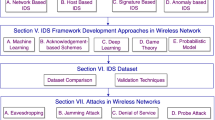Abstract
In Mobile Ad hoc Network, co-operation between mobile nodes is inevitable for enabling reliable network connectivity due to the absence of pre-deployed infrastructure. In such a network, mobile nodes spend significant amount of energy for detecting routes and forwarding packets in order to enforce co-operation. The energy drain of mobile nodes due to the above fact induces them to refuse forwarding of packets for their neighbouring nodes in order to participate in the network. The mobile nodes that forward their own packets but drop the packets received from neighbours are known as selfish nodes. Detecting selfish nodes is one of the most challenging issues that need to be addressed for enforcing co-operation. The core objective of this research work is to essentially identify and highlights various reputation-based selfish node mitigation approaches available in the literature with their merits and limitations. This paper presents context-aware reputation-based selfish node mitigation approaches that are classified into three categories viz., History-based reputation mechanism, Condition probability-based reputation mechanism and Futuristic probability-based reputation mechanism. This paper further presents a review on a number of selfish node mitigation frameworks and also aims in emphasizing the role of statistical reliability co-efficient that could aid in effective and efficient mitigation of selfish nodes.




Similar content being viewed by others
References
Yau. P. W., & Mitchell. C. (2003). Reputation methods for routing security for mobile ad hoc networks. In Proceedings of joint 1st workshop on mobile future and symposium on trends in communications (Vol. 3, No. 5, pp. 130–137).
Liu. J.,& Issarny. V. (2004). Enhanced reputation mechanism for mobile ad hoc networks. In Proceedings of trust management (Vol. 2995, No. 2, pp. 48–62). ser. Lecture Notes in Computer Science. Springer; Berlin Heidelberg.
Safaei, Z., Sabaei, M., & Torgheh, F. (2009). An efficient reputation-based mechanism to enforce cooperation in MANETs. In Proceedings of international conference on application of information and communication technologies (Vol. 5, No. 3, pp. 1–6).
Chen, Y., Zhang, Y., & Yang, G. (2011). Parameter-estimation based trust model for unstructured peer-to-peer networks. IET Communications, 5(7), 922–928.
Srinivasan, A., Teitelbaum, J., & Wu, J. (2006). DRBTS: Distributed reputation-based beacon trust system. In Proceedings of 2nd IEEE international symposium on dependable, autonomic and secure computing (Vol. 5, No. 2, pp. 277–283).
Yang, L., Kizza, J., Cemerlic, A., & Liu, F. (2007). Fine-grained reputation-based routing in wireless ad hoc networks. In Proceedings of intelligence and security informatics (Vol. 3, No. 2, pp. 75–78).
Marti, S., Giuli, T. J., Lai, K., & Baker, M. (2006). Mitigating routing misbehaviour in mobile ad hoc networks. In Proceedings of international conference on mobile computing and networking (Vol. 3, No. 1, pp 255–265).
Michiardi, P., & Molva, R. (2001). CORE: A collaborative reputation mechanism to enforce node cooperation in mobile ad hoc networks. In Proceedings of the IFIP TC6/TC1 16th joint working conference on communications and multimedia security: Advanced communications and multimedia security (Vol. 1, No. 1, pp. 107–121).
Buchegger, S., & Le Boudec, J. -Y. (2002). Performance analysis of the confidant protocol: Cooperation of nodes fairness in dynamic ad-hoc networks. In Proceedings of 3rd IEEE/ACM symposium on mobile ad hoc networking and computing (Vol. 3, No. 1, pp. 226–236).
Refaei, M. T., Srivastava, V., & Eltoweissy, M. (2005). A reputation-based mechanism for isolating selfish nodes. In Proceedings of 2nd annual international conference on mobile and ubiquitous systems: Networking and services ad hoc networks (Vol. 2, No. 3, pp. 3–11).
Anantvalee, T., & Wu, J. (2007). Reputation-based system for encouraging the cooperation of nodes in mobile ad-hoc networks. In Proceedings of international conference of communications (Vol. 2, No. 3, pp. 3383–3388).
Wang, Y., Giruka, V. C., & Singhal, M. (2008). Truthful multipath routing for ad hoc networks with selfish nodes. Journal of Parallel and Distributed Computing, 68(6), 778–789.
He, Q., Wu, D., & Khosla, P. (2004). SORI: A secure and objective reputation-based incentive scheme for ad-hoc networks. In Proceedings of IEEE wireless communications and neworking conference (Vol. 1, No. 1, pp. 825–830).
Tarag, F., & Robert, A. (2006). A node misbehaviour detection mechanism for mobile ad hoc networks. In Proceedings of 7th annual post graduate symposium on the convergence of telecommunications, networking and broadcasting (Vol. 1, No. 1, pp. 78–84).
Binglai Niu, M. I., Vicky Zhao, H., & Hai Jiang, I. (2011). A cooperation stimulation strategy in wireless multicast networks. IEEE Transactions on Signal Processing, 59(5), 50–65.
Senthilkumar, W. J., & Karthikeyan, A. (2014). distributed framework for detecting selfish nodes in MANET using record- and trust-based detection (RTBD) technique. EURASIP Journal on Wireless Communications and Networking, 4(3), 31–39.
Buchegger, S & Le Boudec, J. -Y. (2003). Coping with false accusations in misbehaviour reputation systems for mobile ad-hoc networks. In Proceedings of IEEE Info COMM (Vol. 3, No. 5, pp. 49–57).
Wang, B., Soltani, S., Shapiro, J. K., & Tan, P.T. (2005). Local detection of selfish routing behaviour in ad hoc networks. In Proceedings of international symposium on parallel architectures, algorithms and networks (Vol. 2, No. 3, pp. 23–34).
Kargl, F., Klenk, A., Schlott, S., & Weber, M. (2004). Advanced detection of selfish or malicious nodes in ad hoc networks. In Proceedings of 1st European workshop on security in ad-hoc and sensor network (Vol. 1, No. 1, pp. 255–63).
Chen, T., & Varatharajan, V. (2009). Dempster-Shafer theory for intrusion detection in ad hoc networks. IEEE Transactions on Internet Computing, 3(1), 234–241.
Khusru, M. A., & Sahoo, G. (2013). Classication of selfish and regular nodes based on reputation values in MANET using adaptive decision boundary. Science Research Journal of Communication Networks, 5(1), 185–191.
Goswami, S., & Das, S. (2014). A probabilistic approaches to detect selfish node in MANET. International Journal of Computer Applications, 3(1), 23–26.
Chen, B., Lin Mao, J., Guo, N., Qiao, G. H., & Dai, N. (2013). An incentive detection mechanism for cooperation of nodes selfish behavior in wireless sensor networks. In Proceedings of 25th control and decision conference (Vol. 6, No. 3, pp. 4021–4024).
Hortelano, C., Calafate, T., Cano, J. C., de Leoni, M., Manzoni, P., & Mecella, M. (2010). Black-hole attacks in p2p mobile networks discovered through Bayesian filters. In Proceedings of OTM workshops (Vol. 2, No. 6, pp. 543–552).
Chun, B. -G., Chaudhuri, K., Wee, H., Barreno, M., Papadimitriou, C. H., & Kubiatowicz, J. (2004). Selfish caching in distributed systems: A game-theoretic analysis. In Proceedings of the 23th Annual ACM symposium on principles of distributed computing (Vol. 7, No. 4, pp. 21–30).
Zouridaki, C., Mark., B. L., Hejmo, M., & Thomas, R. K. (2005). A quantitative trust establishment framework for reliable data packet delivery in MANETs. In Proceedings of the 3rd ACM workshop on security of ad hoc and sensor networks (Vol. 1, No. 4, pp. 1–10).
Xing, F., & Wang, W. (2006). Modelling and analysis of connectivity in mobile ad hoc networks with misbehaving nodes. In Proceedings of IEEE conference on communication (Vol. 2. No. 5, pp. 1879–1884).
Guang, L., Assi, C., & Benslimane, A. (2008). Enhancing IEEE 802.11 random back-off in selfish environments. IEEE Transactions on Vehicular Technology, 57(3), 1806–1822.
Vallam, A., Franklin, & Murthy, C. (2008). Modelling co-operative MAC layer misbehaviour in IEEE 802.11 ad hoc networks with heterogeneous loads. In Proceedings of 6th international symposium on modelling and optimization in mobile Ad Hoc and wireless networks (Vol. 5, No. 3, pp. 197–206).
Komathy, P., & Narayanasamy, K. (2007). A probabilistic behaviour model for selfish neighbour network wireless ad hoc network. International Advances in Surgical Oncology Journal of Computer Science and Network Security, 7(7), 77–82.
Xing, F., & Wang, W. (2010). On the survivability of wireless ad hoc networks with node misbehaviours and failures. IEEE Transactions on Dependable and Secure Computing, 7(3), 284–299.
Cardenas, A., Radosavac, S., & Baras, J. (2007). Performance comparison of detection schemes for Mac layer misbehaviour, In Proceedings of 26th IEEE international conference on computer communications (Vol. 4, No. 5, pp. 1496–1504).
Xing, F. (2009). Modelling, design, and analysis on the resilience of large scale wireless multi-hop networks, Ph.D. Dissertation.
Kadiyala, M., Shikha, D., Pendse, R. & Jaggi, N. (2011). Semi-markov process based model for performance analysis of wireless LANs. In Proceedings of international conference on pervasive computing and communications workshops (Vol. 5, No 7, pp. 613–618).
Hernandez-Orallo, E., Serrat, M., Cano, J.-C., Calafate, C., & Manzoni, P. (2012). Improving selfish node detection in MANETs using a collaborative watch-dog. IEEE Communications Letters, 16(5), 642–645.
Azni, A., Ahmed, R., Noh, Z. A. M., Basari, S. H., & Hussin, B. (2013). Correlated node behaviour model based on semi markov process for MANETs. International Journal of Computer Science, 9(9), 25–32.
Azni, A., Ahmed, R., Muhamed Noh, Z., Basari, S. H., & Hussin, B. (2013). Epidermic modelling for correlated node behavior in ad hoc network. International Journal of Chaotic Computing, 1(1), 67–76.
Dhanalakshmi, S., & Rajaram, M. (2008). A reliable and secure framework for detection and isolation of malicious nodes in MANET. International Journal of Computer Science and Network Security, 8(10), 184–190.
Konorski, J., & Orlikowski, R. (2009). A framework for detection of selfishness in multihop mobile ad hoc networks. Journal of Telecommunications and Information and Technology, 2(2), 34–40.
Geetha, S., & Ramani, G. (2012). Trust based secure multipath OLSR routing protocol in MANET using fuzzy theory. In Proceedings of 2nd international conference on computational science, engineering and information technology (Vol 6, No. 3, pp. 120–125).
Wang, Y., Lu, Y. C., Chen, I., Cho, J. C., Swami, A., & Lu, C. (2014). Logittrust: A logit regression-based trust model for mobile ad hoc networks. In Proceedings of 6th ASE international conference on privacy, security, risk and trust (Vol. 5, No. 3, pp. 12–22).
Soto, D., Quezada, L., & Cordova, F. M. (2013). Evaluation of the perspectives of balanced scorecard through of a multicriteria analysis analytic network process (ANP). International Journal of Industrial and Systems Engineering, 13(3), 298–308.
Guo, J., & Zhou, B. (2014). A multi-parameter prediction model for misbehaviour detection in a MANET trust framework. Journal of Applied Science and Engineering, 17(1), 45–58.
Guo, J., & Zhou, B. (2011). A new trust management framework for detecting malicious and selfish behaviour for mobile ad hoc networks. In Proceedings of IEEE Tust Com-11 (Vol. 4, No 2, pp. 142–149).
Webb, N. M., Richard, J., Shavelson., & Haertel, E. H. (2006). Reliability coefficients and generalizability theory. In Handbook of statistics (Vol. 26, No 1). Elsevier press.
Author information
Authors and Affiliations
Corresponding author
Rights and permissions
About this article
Cite this article
Sengathir, J., Manoharan, R. Co-operation Enforcing Reputation-Based Detection Techniques and Frameworks for Handling Selfish Node Behaviour in MANETs: A Review. Wireless Pers Commun 97, 3427–3447 (2017). https://doi.org/10.1007/s11277-017-4677-2
Published:
Issue Date:
DOI: https://doi.org/10.1007/s11277-017-4677-2




